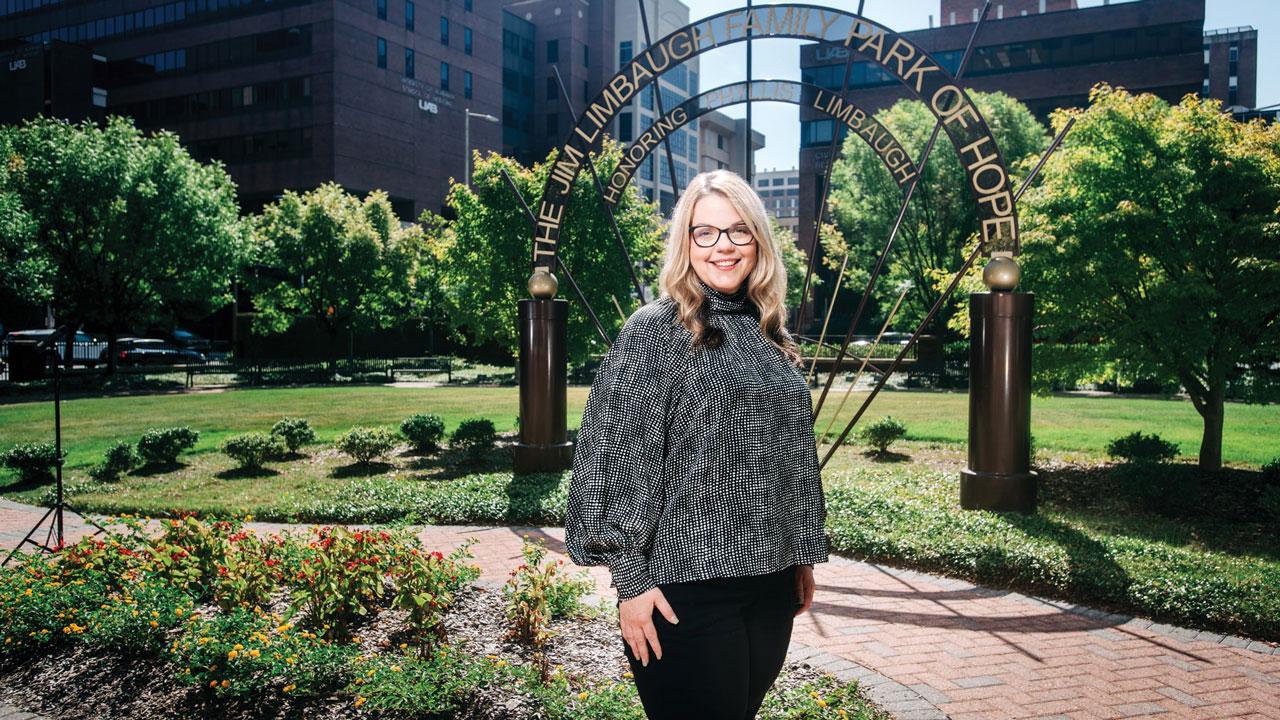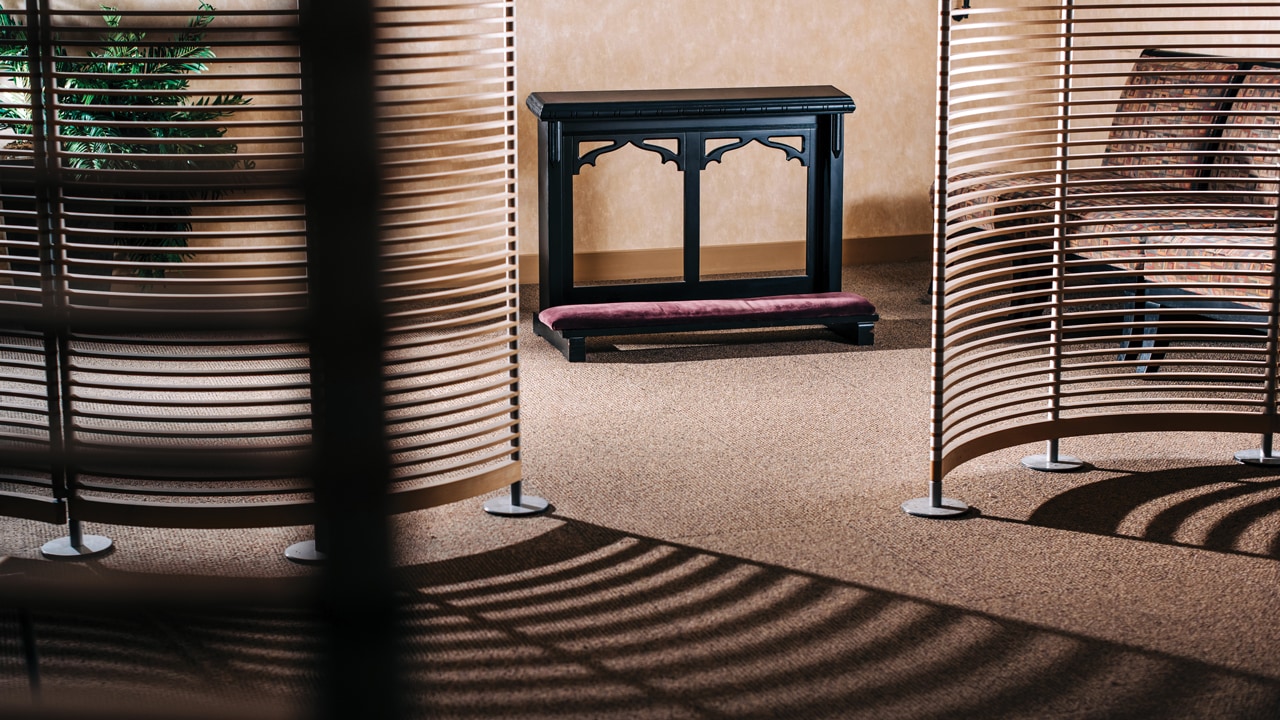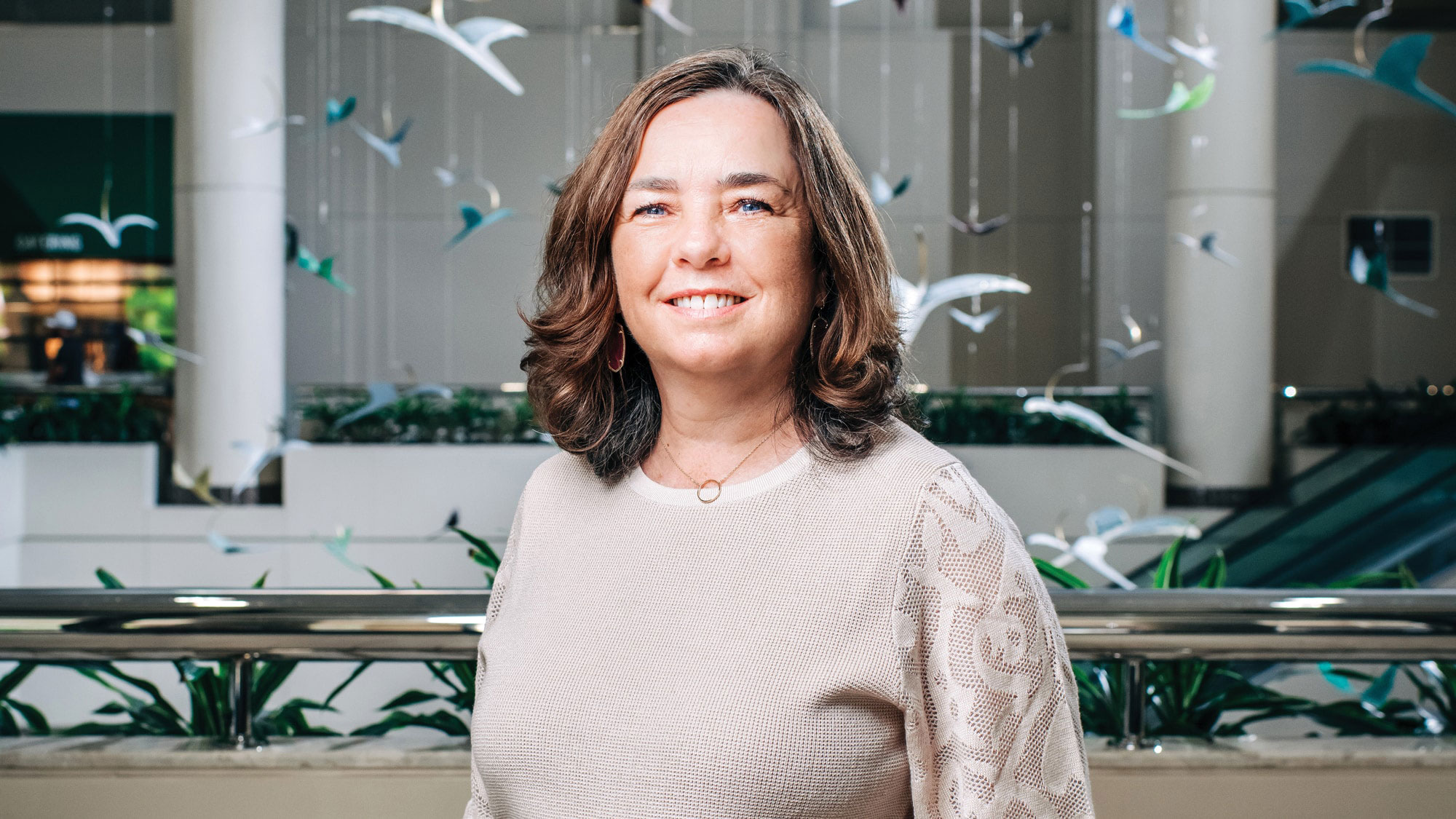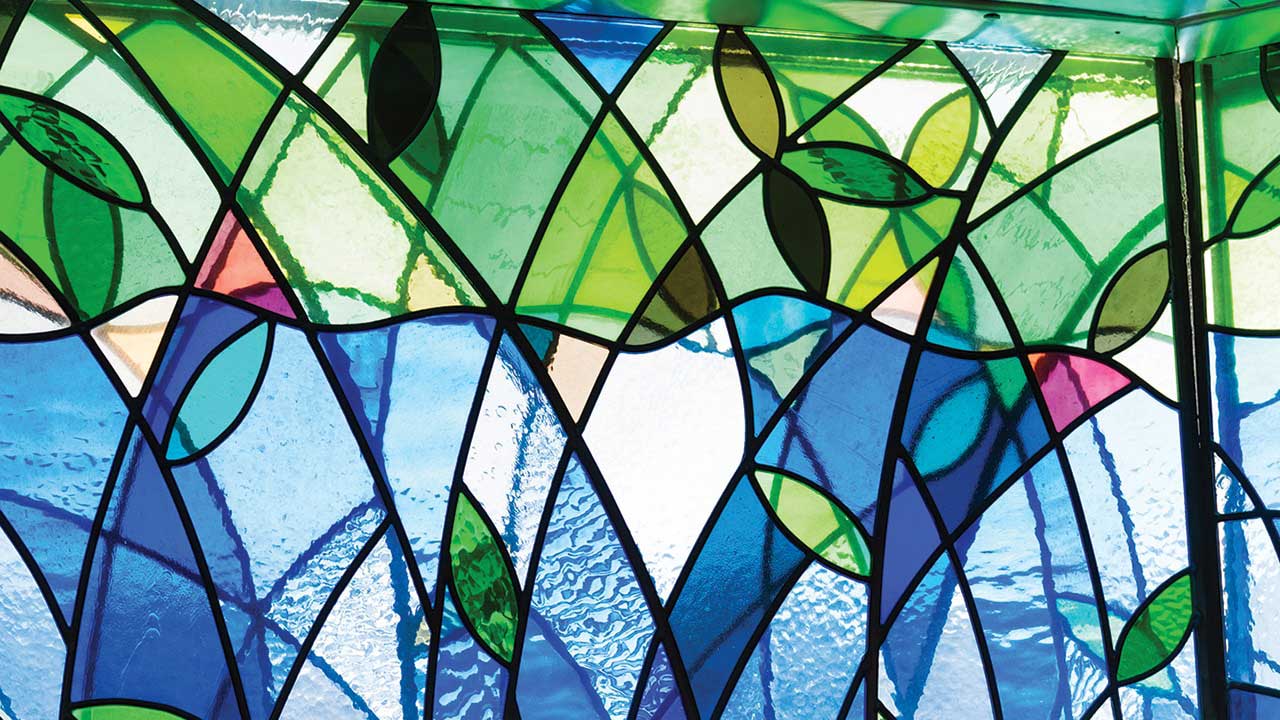Rev. Vic Dippenaar, pictured above in the West Pavilion main chapel, admits he often finds himself in an unhappy work environment. And yet, that is exactly where he wants to be.
Dippenaar’s office, as it were, is UAB Hospital. As the Senior Director of UAB Spiritual Health (formerly known as UAB Pastoral Care), Dippenaar and his team of chaplains provide a valuable service in the health care journey of numerous patients and their loved ones, offering emotional support for the mind and spirit while the doctors and nurses deal with the body.
It is a service that usually is greatly appreciated by those who receive it, even as they adamantly wish they didn’t need it.
“Nobody wants to come to this place,” Dippenaar says of the hospital. “It stirs up emotions. Some people are angry, some are scared, some are sad. Those emotions need to be expressed, and we offer a way for them to do that without judgement by providing in-person spiritual and emotional support.”
This support also extends to UAB Hospital staff members, who can easily become caught up in the emotive cauldron that surrounds them each day. In fact, Dippenaar estimates that the Spiritual Health chaplains—17 full-time, 13 part-time—direct approximately 25 percent of their focus toward working with hospital staff.
“That’s why we assign chaplains to specific units of the hospital, so they can build an informal relationship with staff over time,” Dippenaar says. “Then as that trust builds, they’ll start reaching out to us and sharing who they are and what’s going on in their lives.”

“Creating that caring culture of community is very important to me. It has a healing potential.”
Dippenaar grew up in a small mining town in South Africa. He spent much of his 20s serving at a rural parish in an area with an extremely high rate of HIV infections. By the time he turned 30, Dippenaar says, “I was struggling with feeling burned out.”
So on the recommendation of a colleague, Dippenaar applied to enroll in Clinical Pastoral Education training, and was accepted in 2007 to a one-year residency in Redwood City, California, near San Francisco. The stated goal of CPE is, “The development of personal and pastoral identity, and the growth of professional competence as a minister.”
Dippenaar’s initial plan was to return to South Africa after the residency, but his director convinced him to stay and go through a five-year training program enabling him to teach CPE to others. Shortly after completing that program, Dippenaar received an offer from Malcolm Marler, who was senior director of UAB Pastoral Care, to come to UAB, which started its current CPE program in 2010. Marler retired from that role late in 2021, and Dippenaar was named his replacement the following year.
One of the first things Dippenaar did was initiate the name change to UAB Spiritual Health. He says that title better encapsulates the mission of the department for a hospital and university with such a diverse population.
“We have people from all over the world here. I’m an example of that,” Dippenaar says. “I had a conversation with our team, and we all decided we were ready for this name change. It’s an attempt to be more inclusive and capture a broader population.”
“Spirituality is about connectiveness. It can be a connectiveness to God, but also to other people in the community. We want to establish a community of care for everybody.”
“Spirituality is about connectiveness. It can be a connectiveness to God, but also to other people in the community. We want to establish a community of care for everybody.”
—Rev. Vic Dippenaar, senior director, UAB Spiritual Health

John Kennedy Jr., M.D., has been at UAB since 1981, and he agrees that the name change is a better fit for the university. As the current Director of Wellness for the Heersink School of Medicine as well as an ordained Episcopal deacon, Kennedy went through CPE six years ago and began working at UAB Hospital as a chaplain associate.
“The mission has always been to support people of all faiths, and no faith,” Kennedy says. “I recently saw a patient and family whose faith is Hinduism. Yet they embrace a Christian clergy person to be with them and support them. That’s part of the beauty of what this group does.”
Becoming a member of the Spiritual Health group as a full-time chaplain certainly isn’t easy. The training to be certified for this type of work is both rigorous and time-consuming.
Dippenaar says simply earning a divinity or theology degree takes 7 or 8 years of formal education. That is followed by a year of residency, which is what the CPE program provides, and then another 2,000 hours of in-patient care (approximately a full year of 40-hour work weeks).
Then in order to become officially licensed as a health care chaplain, a person must be board certified. Through written exams and in-person meetings, applicants are judged on 29 competencies. Dippenaar says the acceptance rate is approximately 70 percent.
Even after all that, Dippenaar says chaplains still must submit 50 hours of continuing education each year in order to maintain their certification. The reward is a job that can be demanding and stressful, and pays about $50,000 a year to start.
“So to do this work—to be willing to meet other people every day who are in one of the worst moments of their lives—you have to be motivated by something other than finances,” Dippenaar says. “There has to be some intrinsic motivation. Some refer to it as a calling.”

That is exactly how full-time staff chaplain Treasure Byars describes it. Byars entered the UAB CPE residency training program after spending several months at UAB Hospital with her husband, who passed away following a lengthy illness.
“I experienced firsthand what patients and families sometimes have to go through in situations like that. I saw that need,” Byars says. “So when I heard about the CPE program at UAB, I felt like I had a calling to help others.”

Byars works primarily at the UAB Women & Infants Center. She describes her role there as “a ministry of presence.”
“We just want people to know they are not alone when they’re going through some life-altering circumstances,” Byars says. “There is peace in knowing that somebody is by your side. We listen to the thoughts and feelings that patients and family members are having.”
“We do the same thing with staff. We get to know them because we’re dealing with them on a daily basis. Sometimes they just need to talk through something that bothered them about one of their patients. Ultimately, we’re all human and affected by different things we come across. (Spiritual Health) just provides that extra line of support.”

As Director of Outpatient Rehabilitation Service at UAB Medicine, speech pathologist Jamie Wade, M.S., discovered there are benefits to the Spiritual Health program she had not anticipated. Wade says when she first began working in outpatient recovery, she assumed most of her patients and family members would be optimistic that the worst was behind them. After all, the patients were back home and beginning to reintegrate into their community.
“What was alarming to me was seeing how many people were still grieving over the loss of their prior life, both patients and family members,” Wade says. “I was spending a lot of time meeting with them, and they were angry over things like scheduling. But when I really listened to them, I realized their anger actually was part of this grief process.”
“Then the chaplains started covering our outpatient clinic and began helping them process their emotion. You have to get your emotions out before you can problem-solve, and that’s what the chaplains really offer our patients. I can’t emphasize enough how valuable that is. It made a tremendous difference. Because you can’t compartmentalize the recovery process between the physical and the emotional. It’s all together.”

Kennedy agrees. After spending most of his career dealing primarily with physical ailments, he says his time with UAB Spiritual Health has made him truly realize the value of offering emotional support as well.
“It’s a vital element of providing care in a medical center like this,” Kennedy says. “For the people who come here, it may be the worst time of their lives, and their needs are tremendous. It’s not just physical needs but spiritual ones as well. Even for people who don’t follow a specific faith tradition, just having another human who cares about them and can listen and help them unload their burden is really important.”
That is why Dippenaar makes sure Spiritual Health has a 24/7 presence at UAB Hospital, including in the Emergency Department. After all, a patient’s physical needs are never left unattended, so Dippenaar wants to make sure the same is true for their emotional needs.
“Our goal is to meet people where they are in terms of what they’re experiencing in their particular reason for coming to UAB,” Dippenaar says. “Many people, when they process those experiences, want to make meaning of it. A lot of people do that through their religion, through their relationship with God. However they do it, we want to be there to help.”
